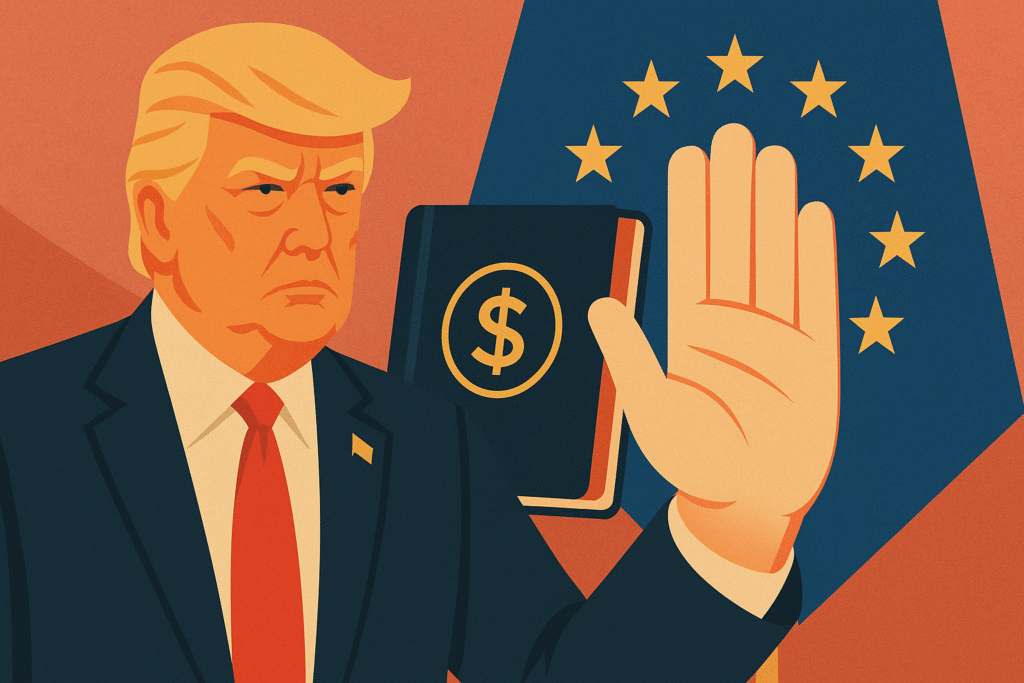Former U.S. President Donald Trump has intensified his tariff campaign against key global partners, issuing new threats and policy demands that experts describe as politically unfeasible and strategically incoherent. The latest wave of tariff threats has raised alarm in both the European Union and Brazil, two regions now caught in the crosshairs of Trump’s unpredictable trade approach.
An Escalating Campaign of Pressure
Last week marked another turbulent period in U.S. trade diplomacy. Despite markets remaining relatively calm, trade experts warn that the situation could deteriorate rapidly by August 1, when Trump’s proposed 30% “reciprocal” tariffs are scheduled to take effect—unless another delay occurs.
In an unusually chaotic week, Trump reportedly sent 14 letters to trade partners by Tuesday, warning of potential tariff hikes. More letters followed, including one addressed to the EU over the weekend threatening higher duties. Analysts say this form of “letter diplomacy” has become a hallmark of Trump’s strategy, combining unpredictability with performative confrontation.
Pressure on Brazil: Lula in the Spotlight
Brazil also found itself unexpectedly targeted, with Trump threatening a 50% tariff. Observers speculate that former Brazilian President Jair Bolsonaro’s allies may have influenced the move, especially as the statement focused on criminal investigations against Bolsonaro without any concrete trade-related demand.
Trump’s approach—demanding outcomes that foreign leaders cannot legally deliver—has been likened to his previous tactics with Mexico and Canada, where he made politically impossible requests on border control and fentanyl trafficking. In Brazil’s case, the threat may ironically boost President Lula da Silva’s domestic support, as it is seen as a violation of sovereignty and an attack on the country’s judicial independence.
The EU’s Weak Response
Meanwhile, the European Union’s response to Trump’s escalating rhetoric has been widely criticized as cautious and ineffective. The European Commission recently suspended planned countermeasures against U.S. tariffs, despite internal dissatisfaction among EU diplomats. President Ursula von der Leyen also delayed using the “anti-coercion instrument” — a tool designed specifically to push back against aggressive trade practices.
Veteran EU lawmaker Bernd Lange criticized the move as showing a “lack of stomach for the fight.” Others argue that the EU is still mistakenly treating the situation as a traditional trade negotiation, despite Trump’s unpredictable tactics.
France Blocks Mercosur Deal, Undermining Strategic Trade Ties
In the broader geopolitical context, France’s continued resistance to ratifying the EU-Mercosur trade agreement—which includes Brazil—has come under scrutiny. Proponents argue that solidifying the agreement would demonstrate the EU’s ability to form independent trade alliances, especially as the U.S. turns increasingly inward.
Lula, unlike his far-left party’s traditional stance, supports implementing the Mercosur deal, seeing it as a practical step for economic expansion and geopolitical balance. However, the EU’s internal divisions continue to prevent a unified front against U.S. protectionism.
A Moment of Opportunity Missed
Many experts believe the EU and its partners could seize the current crisis to show strategic autonomy and solidarity. Instead, Europe’s indecision and Brazil’s defensive posture highlight the widening gaps in global trade cooperation.
While financial markets appear unfazed—suggesting they expect Trump to ultimately back down—analysts warn that continued inaction or incoherent responses from trade partners could embolden Trump further.
Additional Developments in Trade
-
The EU has preliminarily agreed to a trade deal with Indonesia, though key details are pending.
-
Trump has also threatened a 50% tariff on copper, raising concerns among industries that rely heavily on the metal.
-
Lesotho’s garment industry, built under U.S. trade preference programs, is facing severe challenges due to the escalating tariff environment.
-
Experts from the Peterson Institute and the European Council on Foreign Relations warn that quantitative trade restrictions and protectionism are resurging, threatening decades of liberal trade norms.
Conclusion: As Trump doubles down on unilateral trade tactics, countries like Brazil and blocs like the EU face growing pressure to respond decisively. Whether through forging new alliances or standing firm against coercive diplomacy, the global trade landscape is entering a phase where clarity, unity, and resolve will be critical.



